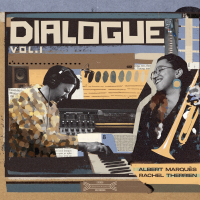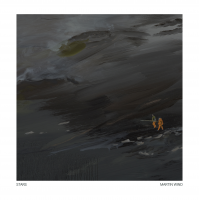Home » Jazz Articles » Album Review » Sara Serpa: Recognition
Sara Serpa: Recognition
The piece has two components, a silent film assembled by Serpa from home movies taken by her grandfather of Portuguese-ruled Angola in the 1960s and a musical soundtrack she composed and did vocals for that also features Mark Turner on tenor saxophone, Zeena Parkins on harp and David Virelles on piano. This work is available from the download-only Biophilia label in two forms, a download code of the music by itself or with an additional code for streaming the film.
The film's images follow a clear narrative path from planes, trains and boats bringing the Portuguese settlers into the country, to African workers hauling buckets and trucks full of minerals under the gaze of white overseers, to recreational bullfights and ornate military parades and ceremonies designed to rally the colonizers and intimidate the natives. Serpa manipulates these images with multiple printing, color distortion and kaleidoscopic effects that give them a feeling of dreamlike unreality. Meanwhile periodic texts flash on screen from the writings of Amilcar Cabral, a African anti-colonialism figure, that lay out the reality of the situation, native Africans living and working at the mercy of a colonial government that saw them as disposable, inferior beings.
On the soundtrack the four musicians fuse together to create a pervasive feeling of unease and sorrow with Serpa's voice wordlessly drifting alongside Turner's subdued and forlorn tenor while Parkins and Virelles either murmur underneath or flare up into their own short, aggressive figures. The music often has a hallucinatory feel that fits right in with the altered visual counterpart.
Serpa also uses spoken or sung words in a few significant movements. On "Beautiful Gardens," her voice echoes over brittle flicks of harp and piano, as she contrasts the waste water flowing from an African workers' camp with the manicured gardens of white workers' nearby homes and talks about a sinister blue van where the Africans would be sent for punishment or worse. On "Queen Nzinga," as Virelles stirs up a rumbling vamp and Turner blows eloquent African-tinged tenor, Serpa tells of a legendary warrior queen from 17th century Angola who defied the European settlers. On the final track, "Unity and Struggle" she sings a hopeful song in multi-tracked voices about the natives reclaiming their lands as piano, tenor and harp surge gently and firmly.
The music and film are compelling together but the soundtrack works on its own as well. Even with little or no knowledge of the subject matter, the music exudes a feeling of melancholy and simmering anger to the listener. It also has a hazy disquiet that seems as much about reflecting on these events from a distance of sixty years as dealing with the events themselves. The angelic, soaring quality of Serpa's voice is balanced by the quiet but relentless force of the other players and they all work beautifully together to capture the music's complex emotions. Whether dealing with just the soundtrack or the complete film, this is a haunting and chillingly beautiful piece of work.
Track Listing
Lei do Indigenato, 1914; Occupation; The Multi-racialism Myth; Free Labour; Beautiful Gardens; Mercy and Caprice; "Civilizing Influence"; Queen Nzinga; Absolute Confidence; Control and Oppression; Propaganda; Unity and Struggle.
Personnel
Additional Instrumentation
Zeena Parkins: tuning forks.
Album information
Title: Recognition | Year Released: 2020 | Record Label: Biophilia Records
Tags
PREVIOUS / NEXT
Support All About Jazz
 All About Jazz has been a pillar of jazz since 1995, championing it as an art form and, more importantly, supporting the musicians who make it. Our enduring commitment has made "AAJ" one of the most culturally important websites of its kind, read by hundreds of thousands of fans, musicians and industry figures every month.
All About Jazz has been a pillar of jazz since 1995, championing it as an art form and, more importantly, supporting the musicians who make it. Our enduring commitment has made "AAJ" one of the most culturally important websites of its kind, read by hundreds of thousands of fans, musicians and industry figures every month.

























